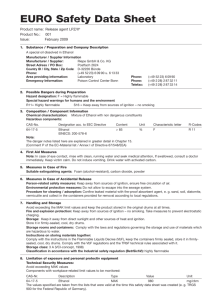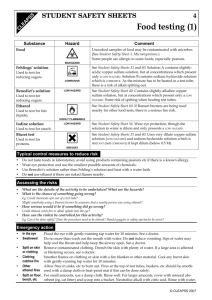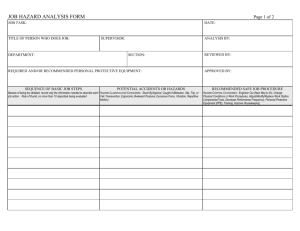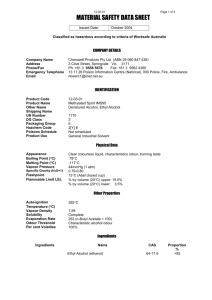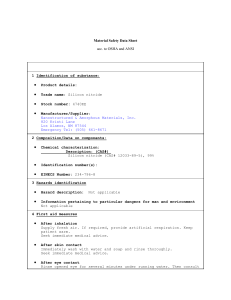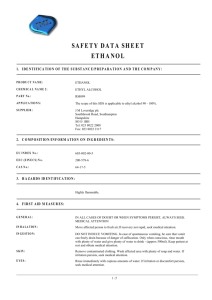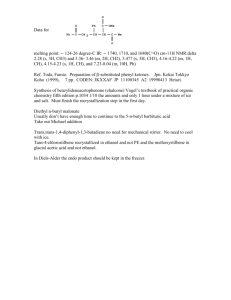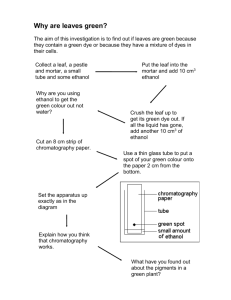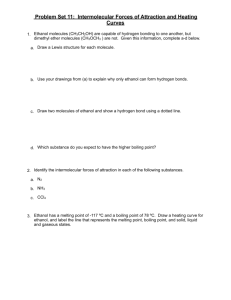MSDS - Neogen Corporation
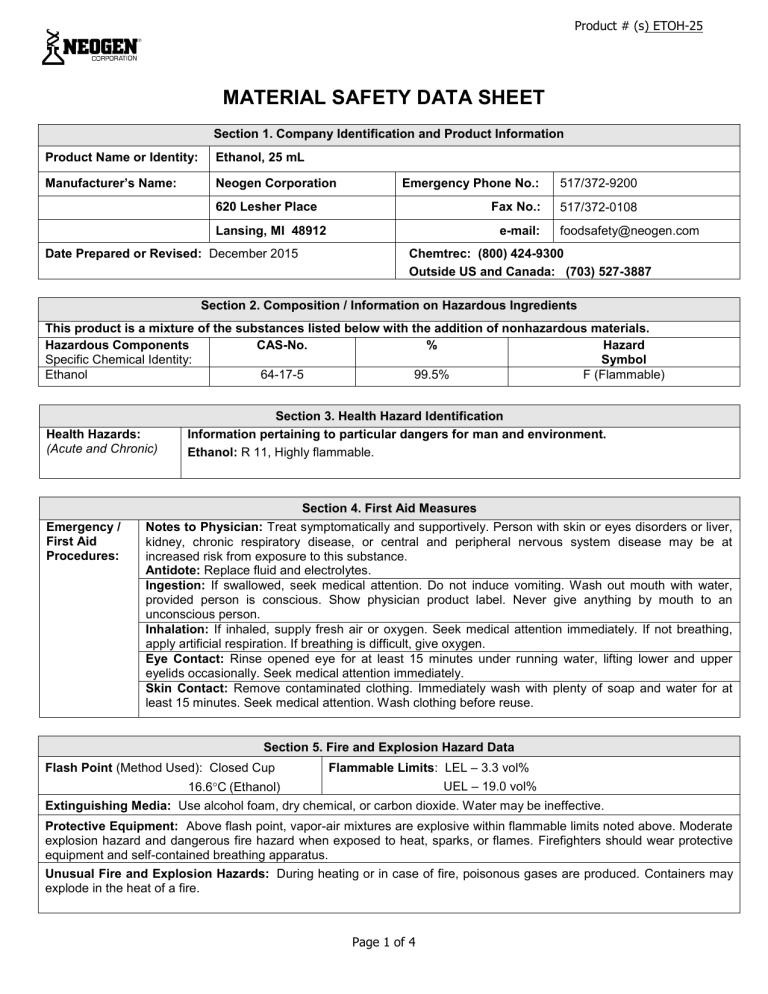
Product # (s) ETOH-25
MATERIAL SAFETY DATA SHEET
Section 1. Company Identification and Product Information
Product Name or Identity: Ethanol, 25 mL
Manufacturer’s Name: Neogen Corporation
620 Lesher Place
Emergency Phone No.: 517/372-9200
Fax No.: 517/372-0108
Lansing, MI 48912
Date Prepared or Revised: December 2015
e-mail: foodsafety@neogen.com
Chemtrec: (800) 424-9300
Outside US and Canada: (703) 527-3887
Section 2. Composition / Information on Hazardous Ingredients
This product is a mixture of the substances listed below with the addition of nonhazardous materials.
Hazardous Components
Specific Chemical Identity:
Ethanol
CAS-No.
64-17-5
%
99.5%
Hazard
Symbol
F (Flammable)
Health Hazards:
(Acute and Chronic)
Section 3. Health Hazard Identification
Information pertaining to particular dangers for man and environment.
Ethanol: R 11, Highly flammable.
Section 4. First Aid Measures
Emergency /
First Aid
Procedures:
Notes to Physician: Treat symptomatically and supportively. Person with skin or eyes disorders or liver, kidney, chronic respiratory disease, or central and peripheral nervous system disease may be at increased risk from exposure to this substance.
Antidote: Replace fluid and electrolytes.
Ingestion: If swallowed, seek medical attention. Do not induce vomiting. Wash out mouth with water, provided person is conscious. Show physician product label. Never give anything by mouth to an unconscious person.
Inhalation: If inhaled, supply fresh air or oxygen. Seek medical attention immediately. If not breathing, apply artificial respiration. If breathing is difficult, give oxygen.
Eye Contact: Rinse opened eye for at least 15 minutes under running water, lifting lower and upper eyelids occasionally. Seek medical attention immediately.
Skin Contact: Remove contaminated clothing. Immediately wash with plenty of soap and water for at least 15 minutes. Seek medical attention. Wash clothing before reuse.
Section 5. Fire and Explosion Hazard Data
Flash Point (Method Used): Closed Cup
16.6
C (Ethanol)
Flammable Limits : LEL
UEL
– 3.3 vol%
– 19.0 vol%
Extinguishing Media: Use alcohol foam, dry chemical, or carbon dioxide. Water may be ineffective.
Protective Equipment: Above flash point, vapor-air mixtures are explosive within flammable limits noted above. Moderate explosion hazard and dangerous fire hazard when exposed to heat, sparks, or flames. Firefighters should wear protective equipment and self-contained breathing apparatus.
Unusual Fire and Explosion Hazards: During heating or in case of fire, poisonous gases are produced. Containers may explode in the heat of a fire.
Page 1 of 4
Product # (s) ETOH-25
Section 6. Accidental Release Measures
Personal Precautions: Shut off all sources of ignition, ventilate spill area. Wear suitable protective clothing, gloves, and eye protection. Wear self-containing breathing apparatus, rubber boots, and heavy rubber gloves. Place contaminated material in a chemical waste container.
Environmental Precautions: Prevent dispersion of material.
Clean-up Methods: Contact safety officer if questions arise and ventilate area. A vapor suppressing foam may be used to reduce vapors.
Section 7. Handling and Storage
Handling: Protect against physical damage. Ensure good ventilation / exhaustion and do not breathe vapor. Avoid contact with eyes, skin, and clothing. Avoid prolonged or repeated exposure. Do not use if skin is cut or scratched.
Storage: Keep container tightly closed. Keep away from heat, sparks, flame and incompatible material. Storage area should be cool, dry, and away from incompatible materials. Containers of this material may be hazardous when empty since they retain product residues. Do not store near perchlorates, peroxides, chromic acid or nitric acid.
Other Precautions: Keep respiratory protective device available.
Section 8. Exposure Controls / Personal Protection
Components with limit values that require monitoring:
Ethanol (64-17-5)
OSHA –PEL: 1,000 ppm TWA TLV: 1,000 ppm
Additional Information: Personal Protection listed below are general requirements for laboratory personnel. Follow the usual precautionary measures for handling chemicals / powder. Avoid contact with eyes, skin, and clothing. In the event of use above flash point, use in closed systems. Do not use compressed air by filling, discharging or handling the product.
Proper ventilation required. Safety shower and eye bath. Use adequate general or local exhaust ventilation to keep airborne concentrations below the permissible exposure limits.
Personal Protective Equipment:
Keep away from food, beverages, and feed.
Wash hands before and after entering laboratory.
Breathing Equipment: In case of brief exposure, use a chemical fume hood or a NIOSH/MSHA-approved respiratory.
Hand Protection: Use chemical resistant gloves.
Eye Protection: Wea r safety glasses.
Body Protection: Wear lab coat or other protective work clothing.
Section 9. Physical and Chemical Properties
Appearance and Odor: Clear liquid, colorless with mild odor.
Boiling Point: 78
C
Melting Point: 114
C
Density: 0.790 @ 20
C
Page 2 of 4
Product # (s) ETOH-25
Section 10. Stability and Reactivity
Stability: Unstable
Stable X Conditions to Avoid: Avoid heat, sources of ignition, moisture, shock, and friction. May degrade on exposure to light.
Incompatibility (Materials to Avoid ) : Incompatible with strong oxidizing agents, ammonia, alkali materials, acid anhydrides, and strong bases.
Hazardous Decomposition or Byproducts: Carbon dioxide (CO
2
), Carbon monoxide (CO), irritating and toxic fumes and gases.
Hazardous Polymerization: May Occur Conditions to Avoid: Incompatible materials, ignition sources, excess heat, oxidizers.
Will Not Occur X
Section 11. Toxicological Information
LD/LC50 values that are relevant:
LD
50
: ORL-RAT, 7,060 mg/kg (Ethanol)
Carcinogenicity Classification:
IARC (International Agency for Research on Cancer) - Not Listed
NTP (National Toxicology Program) - Not Listed
Eye: Produces irritation, characterized by a burning sensation, redness, tearing, inflammation, and possible corneal injury.
Ingestion: May cause gastrointestinal irritation with nausea, vomiting, and diarrhea. May cause systemic toxicity with acidosis. May cause central nervous system depression, characterized by excitement, followed by headache, dizziness, drowsiness, and nausea.
Inhalation: Inhalation of high concentrations may cause central nervous system effects characterized by nausea, headache, dizziness, unconsciousness and coma. Causes respiratory tract irritation. Vapors may cause dizziness or suffocation.
Skin: Causes moderate skin irritation. May cause cyanosis of the extremities.
Chronic: Prolonged or repeated skin contact may cause dermatitis. Chronic inhalation and ingestion may cause effects similar to those of acute inhalation and ingestion. Chronic exposure to laboratory animals have shown tumorigenic effects.
Prolonged exposure may cause liver, kidney, and heart damage. May cause reproductive and fetal effects.
Additional toxicological information: Flammable.
Section 12. Ecological Information
Ecotoxicity Tests: LC
50
: Fish, 96 hours, 13,000 mg/L (Ethanol)
Section 13. Disposal Considerations
Waste Disposal Method: Dispose in accordance with all applicable federal (40 CFR 261.3), state, and local environmental regulations. Contact a licensed professional waste disposal service to dispose of this material if questions arise.
Container Information: Do not remove labels from containers until they have been cleaned.
Section 14. Transport Information
DOT Regulations:
Hazard Class: 3
Identification Number: UN 1170
Packing Group: II
Proper Shipping Name: Ethanol
Remarks: Excepted/Limited quantity.
Page 3 of 4
Product # (s)_ETOH-25
Land Transport ADR/RID (cross-border):
Hazard Class: 3
Identification Number: UN 1170
Packing Group: II
Proper Shipping Name: Ethanol
Remarks: Excepted/Limited quantity.
Maritime Transport IMDG:
Hazard Class: 3
Identification Number: UN 1170
Packing Group: II
Proper Shipping Name: Ethanol
Remarks: Excepted/Limited quantity.
Air Transport ICAO-TI and IATA-DGR:
Hazard Class: 3
Identification Number: UN 1170
Packing Group: II
Proper Shipping Name: Ethanol
Remarks: Excepted/Limited quantity.
Section 15. Regulatory Information
EU Regulations, Hazard Symbol(s):
Ethanol: F (Flammable)
Risk Phrases:
R 11, Highly flammable.
Safety Phrases:
Ethanol: S 7 / 16, Keep container tightly closed. Keep away from sources of ignition, no smoking.
Section 16. Other Information
This document is believed to be correct, but does not purport to be all inclusive and shall be used only as a guide. Neogen
Corporation shall not be held liable for any damage resulting from handling or from contact with the above product. These suggestions should not be confused with state, municipal or insurance requirements, and constitute NO WARRANTY.
Page 4 of 4
Rev 01, December 2015
